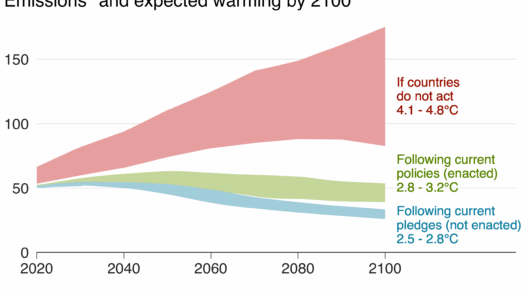The intricate interplay between climate change and the retail sector, particularly health food businesses, presents a multifaceted challenge that transcends mere economic implications. As the climate continues to fluctuate due to global warming, the repercussions on food supply chains, consumer behavior, and the overall health of the populace become increasingly evident. This discourse delves into these complexities, elucidating how global warming is shaping the landscape for retailers focused on health food.
Climate change, primarily characterized by rising temperatures and erratic weather patterns, poses a direct threat to agriculture— the cornerstone of health food retailing. Crops are susceptible to droughts, excessive rainfall, and unseasonable weather, which can precipitate significant variations in yield. For instance, staple health food crops such as quinoa, kale, and various legumes may not flourish under altered climatic conditions. Consequently, the health food business may face substantial difficulties in sourcing reliable, organic produce, resulting in inflated prices or diminished availability.
Moreover, the unpredictability of climate-related events contributes to supply chain disruptions, which can dramatically affect inventory management within health food retailers. A retailer’s ability to maintain a steady flow of fresh and organic produce is instrumental to its success. If adverse conditions result in crop failures or diminished harvests, retailers may struggle to fulfill customer expectations. In such scenarios, health food businesses may be compelled to source their products from diverse regions or turn to alternatives, raising questions surrounding the sustainability and ethics of these shifts.
Moving beyond the supply side, consumer behavior is evolving in response to increasing awareness about climate change. Shoppers are more discerning than ever regarding the provenance and production methods of their food choices. They seek transparency, desiring information about how climate impacts the food they consume. Retailers must adapt their marketing strategies to incorporate sustainability narratives and highlight eco-friendly practices. This demand for ethical sourcing can create both opportunities and challenges; while it can drive sales for sustainable brands, it can also alienate those unable to meet these rising expectations.
Another consequence of global warming is the shifting dietary preferences as consumers become more health-conscious and ecologically aware. Data indicate a growing inclination towards plant-based diets, spurred by empirical evidence linking such diets to reduced carbon footprints and improved personal health. Health food retailers must recognize and embrace this change, diversifying their product offerings to cater to the vegan and vegetarian markets. This not only serves customer desires but also positions the retailer as a responsible player in the face of climate change.
Furthermore, climate change has significant implications for food safety, which poses a pressing concern for health food businesses. Warmer temperatures can exacerbate the proliferation of pests and pathogens, potentially jeopardizing the integrity of organic produce. Retailers must bolster their food safety protocols to mitigate these risks, investing in advanced technologies for tracking and monitoring food quality. Consumers expect nothing less than the highest standards when it comes to the food they purchase, particularly from retailers touting health benefits.
Innovative solutions must also be explored to combat food waste, which is intrinsically linked to climate change and sustainability. As health food retailers navigate fluctuating supply chains, they encounter the inevitable challenge of perishable goods. Implementing strategies for waste reduction—such as composting, adopting better inventory systems, or collaborating with local food banks—can not only lessen the retailer’s ecological footprint but also enhance their reputation within the community. Engaging in such initiatives reinforces the retailer’s commitment to combating climate threats, thereby fostering customer loyalty.
The relationship between retailers and their stakeholders is being reconsidered in the context of climate change. Suppliers, customers, and even local communities are integral to the strategy employed by health food retailers. Collaborative efforts can yield innovative practices that promote sustainability. For instance, retailers may partner with local farmers to support regenerative agricultural practices that sequester carbon and enhance soil health. These alliances can forge a sense of shared purpose, positioning the health food retailer as an agent of change within the community.
In the digital age, online platforms are reshaping the retail environment significantly. eCommerce channels provide health food businesses with a vehicle to widen their reach, though they also demand rigorous management of carbon footprints. To align with sustainability goals, online retailers are adopting practices such as carbon offsetting and optimizing delivery routes to minimize environmental impact. The integration of sustainable logistics presents a compelling narrative for customers concerned about climate implications.
Pressing ahead, legislation surrounding climate change is becoming more robust, heralding potential repercussions for health food retailers. As governments introduce stricter regulations aimed at curbing greenhouse gas emissions and promoting sustainable practices, retailers must remain adaptive and proactive. Compliance not only ensures legal adherence but can herald opportunities by differentiating forward-thinking brands in a crowded market.
In conclusion, the ramifications of global warming on health food businesses are profound and multifaceted. As retailers navigate the complexities of supply chain disruptions, evolving consumer behavior, and regulatory landscapes, they must prioritize sustainability and health. By embracing innovative solutions and fostering collaborations, health food retailers can thrive in a changing climate while actively contributing to a more sustainable future. The challenges posed by climate change stand to redefine the retail sector’s operational paradigms, demanding a commitment to resilience, ethics, and environmental stewardship. In meeting these challenges head-on, the health food business sector not only safeguards its future but enhances its role as a leader in the movement towards a more sustainable food system.








